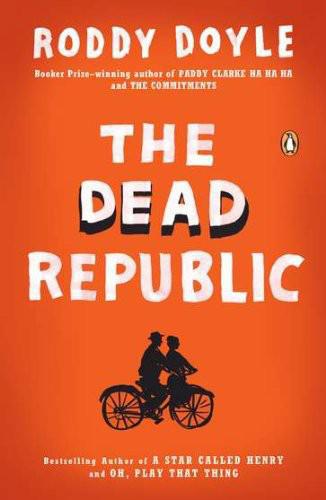
The Dead Republic
Last Roundup Series, Book 3
کتاب های مرتبط
- اطلاعات
- نقد و بررسی
- دیدگاه کاربران
نقد و بررسی

Starred review from February 8, 2010
Doyle digs into the modern history of Ireland in the concluding volume to the life story of Henry Smart, a teenage Sinn Fein triggerman first encountered in A Star Called Henry
. Here, an aging Henry must preserve his own legend, which is taken away from him first for a film, and then by the IRA. In the mid-1940s, film director John Ford plans to make a movie based on Henry’s life, but Henry eventually realizes the film that Ford has planned will reduce his story to sentimental pap. Upon returning to Ireland with Ford, Henry plans on killing the director, but his callousness has faded, and he drifts into the Dublin suburbs, where he meets a respectable widow who may be his long-disappeared wife. Henry ages in obscurity until the ’70s, when the IRA uses a distorted version of Henry’s story as a PR ploy; as the IRA man who runs Henry explains, “we hold the copyright” to the Irish story. Doyle is a stellar storyteller, though not a faultless one—characters tend to editorialize at the drop of a hat; yet Doyle exhibits a peerless ear for cynicism as he grapples with the violence and farce of Irish history.

Starred review from April 15, 2010
Doyle's latest concludes the saga of Henry Smart, the Irish revolutionary first introduced in "A Star Called Henry" (1999) and revisited in "Oh, Play That Thing" (2004). Here, the Irish rebel is older, perhaps wiser, and alive after having once again cheated a certain death. Opening in the 1940s and concluding in 2010, the book propels readers on a dizzying trajectory from film-studio lots in the States to quiet suburbs north of Dublin. Though Smart is retired, his old loves and enemies reappear, and admirers insist on making his acquaintance. Pressed into action, he crisscrosses parishes in the Republic and counties in the North, sometimes walking on his wooden leg and sometimes riding in a car or van with a pillowcase over his head. Doyle suggests that there is no escape for anyone with a past that others have claimed for themselves. VERDICT Once again, Doyle masterfully renders Henry Smart's voice. A triumphant tale from a lyrical and thoughtful storyteller. [See Prepub Alert, "LJ" 1/10.]J. Greg Matthews, Washington State Univ. Libs., Pullman
Copyright 2010 Library Journal, LLC Used with permission.

February 1, 2010
The final installment in Doyles trilogy featuring ex-IRA assassin Henry Smart serves up less of a bang than readers might have hoped. At the end of the previous installment, Oh, Play That Thing (2004), Smart, who moved to the States to escape his violent past, is rescued from certain death in the California desert by actor Henry Fonda. He soon finds himself collaborating with distinguished director John Ford on a movie based on his life, the filming of which brings him back to his native Dublin. When Smart sees how Ford is over-sentimentalizing his risky rebel days, he cuts all ties with the director and settles into a quiet existence working as a caretaker at a rural boys school. He shacks up with a woman named Missus OKelly (might she be his long-lost beloved lass, Miss OShea?). Life goes along peacefully until Smart is injured in a bombing. Newspaper coverage of the incident divulges facts about his past, and suddenly the reformed bad guy is besieged by the unsavory types hes spent decades trying to forget. The Dead Republic has Doyles trademark staccato style, but it lacks the breathless exuberance of parts 1 and 2. Nonetheless, readers will want to tune in to see what fate awaits the irrepressible Irishman.(Reprinted with permission of Booklist, copyright 2010, American Library Association.)

























دیدگاه کاربران